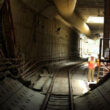When it comes to running a successful business, a sturdy and well-maintained roof is crucial. Commercial roofing plays a vital role in protecting a company’s assets, employees, and customers from the elements. But what exactly is commercial roofing, and why is it so important for businesses?
In a nutshell, commercial roofing refers to the roofing systems installed on commercial buildings, such as offices, warehouses, and retail spaces. These roofs differ from residential ones in terms of size, materials used, and the installation process. Their primary function is to provide durable protection and insulation for large-scale structures, safeguarding the business operations within.
The significance of this service cannot be overstated. A well-maintained roof not only enhances the aesthetic appeal of a business property but also ensures the safety and comfort of everyone inside. Additionally, it serves as a long-term investment, as proper maintenance can prevent costly structural damage and maintain the overall value of the property.

The Importance of Quality Roofing
1. Protecting the Investment
A robust commercial roof not only shields the physical structure of a building but also safeguards its assets, inventory, and most importantly, its employees. A well-maintained roof acts as a barrier against weather elements, preventing damage to valuable equipment and merchandise. Moreover, it ensures a safe and secure environment for employees, fostering productivity and a sense of well-being.
2. Enhancing Energy Efficiency
Proper installation and insulation of a commercial roof contribute significantly to the energy efficiency of a building. By effectively regulating indoor temperatures, a quality roof helps reduce heating and cooling costs.
3. Impressions and Brand Image
The visual appeal and maintenance of a commercial roof play an instrumental role in shaping the overall impression of a business. A well-kept roof communicates professionalism, reliability, and attention to detail, positively influencing how customers, employees, and visitors perceive the brand. It serves as a visual representation of the company’s commitment to excellence, leaving a lasting impression and building trust among stakeholders.
In essence, investing in high-quality commercial roofing is not just a matter of structural integrity; it is an investment in the overall success and reputation of a business.
Types of Commercial Roofing Materials

When it comes to roofing, it is crucial to consider the variety of materials available to ensure the best solution for your specific needs. Let us delve into the several types of commercial roofing materials and their unique benefits.
1. Flat Roofing
Flat roofing (see more here) is a popular choice for commercial buildings due to its cost-effectiveness and durability. Ethylene Propylis is a commonly used material, Thermoplastic Polyolefin (TPO), and Polyvinyl Chloride (PVC) are commonly used materials for flat roofing.
Like Us on Facebook!
EPDM offers excellent resistance to weathering, abrasion, and heat, making it a reliable choice for commercial applications. TPO is known for its energy efficiency and resistance to UV radiation, while PVC provides superior strength and fire resistance. These materials are suitable for various commercial structures, including retail and industrial buildings, thanks to their versatility and long-lasting performance.
Subscribe Us on YouTube!

2. Metal Roofing
Metal roofing is renowned for its unparalleled durability, energy efficiency, and minimal maintenance requirements. It provides exceptional protection against harsh weather conditions, including heavy rain, snow, and high winds. Additionally, metal roofing reflects solar radiant heat, reducing cooling costs and promoting environmental sustainability.
Metal roofing is an ideal choice for commercial properties seeking a long-term roofing solution that offers both strength and aesthetic appeal. With a wide range of design options and finishes available, metal roofing can complement various architectural styles while providing superior protection and longevity.
3. Slate and Tile Roofing
Slate and tile roofing are valued for their classic aesthetic appeal and remarkable lifespan. Both materials offer a timeless, sophisticated look that enhances the visual appeal of commercial buildings. Slate roofing, sourced from natural stone, exudes elegance and charm while providing exceptional durability and weather resistance.
Tile roofing, available in various materials such as clay or concrete, delivers a distinct visual impact and exceptional longevity. Considered a sustainable roofing option, tile roofing is highly resistant to fire, rot, and insect damage. Their durability and low maintenance requirements make slate and tile roofing an excellent investment for commercial properties looking to achieve a distinctive and enduring roofing solution.

Roofing Maintenance and Repairs
Maintaining and repairing your commercial roof is crucial for preserving its structural integrity and ensuring its longevity. Regular inspections and maintenance, addressing common roofing issues, and understanding when repair or replacement is necessary are all essential components of effective roof care.
You can find more information on roof maintenance at the site listed here: https://www.ownerly.com/home-improvement/roof-maintenance/
1. Regular Inspections and Maintenance
Regular inspections and maintenance play a significant role in preventing costly damage to your commercial roof. By identifying and addressing small issues early on, you can avoid more extensive and expensive repairs in the future. Additionally, proactive maintenance helps to extend the lifespan of your roof, ultimately saving you time and money.
2. Addressing Common Roofing Issues
Common roofing issues such as leaks, ponding water, and membrane damage can compromise the performance of your commercial roof. It is important to promptly address these issues using best practices. Implementing proper drainage systems, repairing damaged membranes, and identifying and sealing leaks are crucial steps in maintaining the structural integrity of your roof.
3. Repair vs. Replacement
Understanding when to opt for repairs versus a full roof replacement is essential. While repairs can address specific issues and prolong the life of your roof, there comes a point where replacement becomes the more cost-effective and practical solution. Factors such as the extent of damage, the age of the roof, and ongoing maintenance costs should all be considered when making this decision.
Incorporating a proactive approach to roof maintenance and addressing issues promptly can contribute to the overall efficiency and longevity of your commercial building. By staying proactive and attentive to your roof’s needs, you can mitigate potential issues and minimize the impact of unexpected damage.
Selecting a Commercial Roofing Contractor
When it comes to protecting your property, selecting the right roofing contractor is crucial. Thankfully, it is not difficult to find the services to help. On the contrary, it’s quite easy, as there are plenty of commercial roofing services provided by no shortage of companies. The only true difficulty in finding one is whether you prefer to do so through traditional or online methods.
Conclusion
In conclusion, the significance of commercial roofing cannot be overstated. It serves as a shield against the elements, maintains the structural integrity of the building, and contributes to the overall safety and security of the business premises. Investing in high-quality materials, adhering to maintenance schedules, and entrusting professional contractors are key steps in ensuring the reliability and durability of commercial roofing systems.













